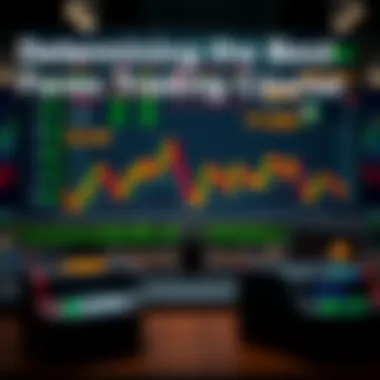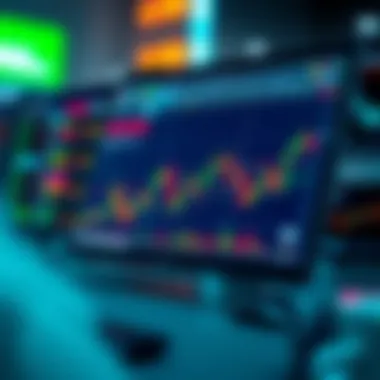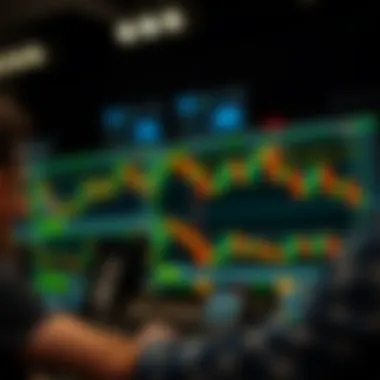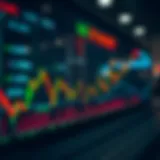Choosing the Right Forex Trading Course: A Guide


Intro
Navigating the murky waters of forex trading can feel a bit like trying to find your way through a dense fog. With so many courses promising the secret sauce to success, how can a trader discern which ones are legitimate and truly insightful? The realm of foreign exchange, with its unique terms and strategies, requires more than just a passing knowledge to excel. Hence, understanding the nuances of forex trading education becomes crucial.
This guide aims to shed light on the essential aspects of selecting a suitable forex trading course. By delving into the criteria that make a course effective, examining the experience of instructors, and stressing the need for serous hands-on practice, we will build a road map for aspiring traders.
As you journey through this article, you'll be equipped with the tools needed to evaluate various learning formats, grasp the importance of continual education, and ultimately, choose the forex course that resonates with your trading aspirations. So, buckle up as we dissect the elements of forex training!
Investment Terminology Breakdown
Grasping the fundamental lingo of forex trading is akin to learning the basics of a new language. If you're just jumping into this field, you might be tongue-tied by terms that get thrown around like confetti at a parade. But don’t fret; let's break it down.
Common Investment Terms Explained
- Pips: Referring to ‘percentage in point,’ a pip is the smallest price move that can be observed in the exchange rates. It’s something every trader should keep their eye on.
- Leverage: This concept allows traders to control larger amounts of money than they actually possess. While it magnifies potential profits, it can just as easily amplify losses.
- Spread: The difference between the buying and selling prices. Knowing how to spot a good spread can save you many dollars over time.
- Margin: The amount of money required to open a leveraged position. Understanding margin is vital for managing risk effectively.
Understanding Financial Jargon
The financial world loves its jargon, and forex trading is no exception. Some terms can be particularly challenging to grasp for newcomers.
- Bullish/Bearish: Bullish signifies an optimistic outlook on market prices, while bearish reflects a pessimistic view.
- Technical Analysis: This method involves analyzing price charts and indicators to predict future price movements, differentiating it from fundamental analysis, which looks at economic factors.
- Order Types: From market to limit orders, knowing how to place trades effectively is rewarding as it directly impacts execution and profits.
Being well-versed in these terms is essential for any trader looking to seriously engage with the forex markets. Understanding these concepts allows traders to navigate discussions, research, and strategies beyond what they might casually encounter.
Financial Product Reviews and Comparisons
In a world as dynamic as forex, understanding the tools at your disposal is crucial. There’s no shortage of platforms offering courses and associated products aimed at budding traders, but discerning their value requires a keen eye.
In-Depth Product Analysis
Different forex trading courses are available, each touting unique strategies and teaching methods. Some might focus on day trading, while others take a more long-term investment approach. What's crucial here is to ensure the course aligns with your personal trading style and goals.
For instance, a beginners' course may emphasize foundational strategies while an advanced session harnesses complex indicators and techniques tailored for seasoned traders. Carefully examining each option against your learning style can make a world of difference in your trading journey.
Pros and Cons of Financial Products
Every platform has its strengths and weaknesses, and it pays to do your homework.
- Pros:
- Cons:
- Access to expert instructors with hands-on experience.
- Comprehensive materials that cover different trading styles.
- Community support for peer trading experiences.
- Some courses focus on theory without practical exercises.
- High costs for premium services can be prohibitive.
- The overwhelming availability of information might cause confusion rather than clarity.
Understanding Forex Trading
In the expansive realm of finance, understanding Forex trading isn't merely a helpful skill—it's imperative for anyone serious about navigating global markets. This section serves as a foundational primer, honing in on what Forex trading entails and why it holds immense significance for investors looking to broaden their portfolios.
Definition of Forex Trading
Forex trading, short for foreign exchange trading, refers to the act of buying and selling currencies in the foreign exchange market. Unlike traditional stock markets, Forex operates 24 hours a day, five days a week, allowing traders from across the globe to engage at any given moment. This market is the largest and most liquid financial market in the world, boasting a daily trading volume exceeding $6 trillion.
In practical terms, Forex trading involves currency pairs, such as EUR/USD or GBP/JPY. A trader will speculate on the value of one currency relative to another, aiming to profit from fluctuations in exchange rates. For instance, if a trader buys the EUR/USD pair at 1.10 and later sells it at 1.15, they've realized a profit of 500 pips (assuming a standard lot).
Importance of Forex Trading
The importance of Forex trading is multi-faceted, with benefits that can significantly impact one's financial landscape. Here are several key reasons why gaining an understanding of Forex trading is essential:
- Portfolio Diversification: Forex trading allows investors to diversify their holdings, reducing risk and opening up opportunities for gains in different market conditions.
- Liquidity: The Forex market's high liquidity means that traders can enter and exit positions easily, ensuring that they can capitalize on price changes quickly.
- Accessibility: With various online platforms available, Forex trading is accessible to nearly anyone with an internet connection. This democratization of trading empowers individual investors and small traders.
- Leverage Opportunities: Forex trading typically allows for significant leverage, enabling traders to control larger positions with a relatively small capital outlay. However, this also demands a thorough understanding of risks and money management practices.
- Global Economic Insights: Engaging with the Forex market provides valuable insights into global economic trends. Currency movements often reflect underlying economic conditions, and understanding these correlations can benefit investors in multiple areas.
Understanding Forex trading is not merely about knowing how to make trades; it involves grasping the complexities of currency behaviors and their driving factors. As such, this segment serves as a vital stepping stone for readers keen on exploring the selection of Forex trading courses that will guide their educational journey.
Criteria for Selecting a Forex Trading Course


Choosing the right forex trading course is not just a walk in the park; it’s a crucial step for anyone looking to dive into the complex waters of currency trading. The market is teeming with options, making it imperative to focus on specific criteria that can guide you toward a solid educational experience. Whether you are a neophyte eager to understand the basics or an experienced trader seeking to sharpen your skills, the following criteria are essential in identifying a course that meets your needs. By paying attention to these elements, you can enhance not only your understanding but also your potential for success in the dynamic forex marketplace.
Reputation and Reviews
The reputation of a forex trading course can speak volumes. In the digital age, you can’t throw a stone without hitting opinions and reviews. It’s vital to sift through this information carefully. Pay attention to what previous students are saying; their first-hand experiences can be informative. Look for testimonials and achievements shared by alumni. However, take them with a grain of salt. Some may be exaggerated or manipulated to create a favorable image. Websites like Reddit and various forums often have discussions that can provide insight into a course's authenticity.
Additionally, check if the course is affiliated with reputable institutions or recognized bodies in the forex trading community. Associations or accreditation can often serve as a red flag or a green light in your decision-making process.
Course Structure and Content
It’s crucial to examine how a course is structured and the content it offers. A good course should lay out a well-organized curriculum that spans from foundational principles to advanced trading strategies. Look for modules that cover different aspects of forex trading, such as market analysis, chart reading, and risk management. If the course includes diverse materials, like videos, articles, and assignments, you’re likely looking at a more robust offering. Keep an eye out for whether the course allows flexibility in pacing; this is especially helpful for those juggling other commitments.
Here’s a thought: Does the course format suit your learning preferences? Some learners thrive with a visual approach, while others prefer text-based or hands-on experiences.
Instructor Credentials
An often overlooked but crucial factor is instructor credentials. Who is guiding you on this trading journey? Instructors with solid backgrounds in finance and a proven track record in trading can provide credibility to the course. Look for instructors who have practical experience in the forex market, as theoretical knowledge alone might not suffice. Prominent figures who have authored books, conducted seminars, or have a presence in forex trading communities often carry an air of authority that can enhance your learning experience. LinkedIn profiles and biographies on course websites can shed light on their experience and qualifications.
Practical Application and Simulations
Theory without practice is like a boat without a paddle. A forex trading course should offer hands-on experience through practical applications and simulations. An ideal course includes features like real-time trading simulations or virtual trading platforms where you can practice without financial risk. This kind of exposure is invaluable as it builds confidence and helps prepare you for actual trading scenarios. By engaging actively, you're better positioned to grasp strategies and understand market movements.
Support and Resources
Finally, the level of support offered by the course can drastically impact your learning experience. Does the course provide access to resources such as trading communities, forums, or one-on-one mentor sessions? Networking and engagement with instructors and fellow students can often lead to new insights and improve your understanding significantly. Furthermore, a well-rounded course should offer materials beyond the basics: eBooks, webinars, and possibly ongoing mentorship or coaching can enhance your knowledge long after the course has ended.
It’s important to gauge what support structures are in place. Ask questions and don’t shy away from engaging with the course representatives.
Evaluate thoroughly to find a course that truly meets your needs; the right course can turn the daunting world of forex trading into an approachable and successful venture.
In sum, the criteria for selecting a forex trading course can guide you in finding an educational resource that suits not just your learning style but also your trading aspirations. From instructor reputation to actionable simulations, taking the time to analyze these factors can pay off in the long run.
Types of Forex Trading Courses
In the world of forex trading, the plethora of educational avenues may leave a newcomer feeling overwhelmed. Selecting the right kind of course entails understanding each type's unique features, advantages, and how they align with individual learning preferences and goals. As such, delving into the varying types of forex trading courses is invaluable for making an informed decision.
Online Courses
Online courses represent a popular choice among traders seeking flexibility in their educational journey. They provide an array of learning materials, including video lectures, quizzes, and discussion boards that can be accessed at the learner's convenience.
The main benefit of online courses is that they often cover a wide range of topics—from the fundamentals of forex trading to advanced strategies in risk management. Platforms such as Udemy or Coursera often host courses taught by seasoned traders who provide insights based on real-life trading experiences. This makes for a more relatable learning experience.
However, it is crucial to evaluate the course content carefully. Not all online courses are created equal, and some may lack depth or current relevance. Choosing a course with recent updates and robust material is essential to ensure the information aligns with today’s trading environment.
In-Person Workshops
For individuals who thrive on face-to-face learning, in-person workshops can be incredibly beneficial. These workshops offer the opportunity to interact directly with knowledgeable instructors and fellow traders, creating a dynamic learning atmosphere. Participants can engage in real-time discussions, ask questions, and receive immediate feedback—something that's often missing in online formats.
In-person workshops typically focus on hands-on trading exercises, making the learning experience more tangible. Additionally, connecting with other traders can foster a sense of community and open up networking prospects. However, it’s worth considering that logistics such as travel, time commitment, and potentially higher costs could be obstacles for some learners.
Webinars and Online Seminars
Webinars and online seminars provide a middle ground between online courses and traditional classroom environments. These live sessions allow for interaction with the instructor, making it feel almost personal despite being conducted online. They often feature expert guest speakers covering specialized topics such as technical analysis or forex trading psychology.
Moreover, webinars tend to be more time-efficient, as they often last just an hour or two. Recordings are typically available afterward, allowing participants the flexibility to rewatch sessions at their leisure. It’s a great way to absorb information while still having the option to revisit complex topics later. Yet, sometimes these webinars can be crowded and may not allow for individual attention.
Private Tutoring and Mentorship
Private tutoring and mentorship offer a customized learning approach tailored to individual needs. This hands-on method can be especially effective for traders looking for dedicated, focused guidance. Whether through one-on-one sessions, email consultations, or comprehensive trading plans, mentors can provide personalized strategies and insights that align with the trader's experience level and goals.
These arrangements can forge accountability, as having someone to report back to often fosters consistency in learning and application. However, as one would assume, this form of education usually involves a higher financial commitment compared to group classes or online courses. Be careful in selecting a tutor with proven expertise to ensure the investment yields substantial returns.
"The best investment you can make is in yourself. The more you learn, the more you earn." — Warren Buffet


In summary, each type of forex trading course has its advantages and drawbacks. Whether you prefer the flexibility of online courses, the interactive nature of in-person workshops, the efficiency of webinars, or the tailored guidance from private tutoring, it's essential to choose a format that complements your learning style and trading objectives. Ultimately, this choice will greatly influence your journey in the dynamic realm of forex trading.
Popular Forex Trading Courses
Choosing the right forex trading course is like selecting a fine wine; it requires careful consideration and a taste for quality. With the vast sea of options available, understanding which courses stand out can make a monumental difference in your trading journey. This section dives into popular forex trading courses, emphasizing their unique offerings, benefits, and the critical factors to weigh when selecting among them.
Overview of Leading Programs
When it comes to forex trading education, not all programs are created equal. Certain platforms have carved out a niche, providing comprehensive training that caters to different skill levels. Some of the leading programs include Forex School Online, which offers a structured learning path with an emphasis on practical application. This course is particularly beneficial for those who prefer a guided approach combined with self-paced learning.
Another noteworthy program is Babypips, which is known for its engaging content and community support. Their School of Pipsology is an excellent resource for beginners, offering interactive lessons that break down complex topics into manageable bites.
There’s also the DFX Trading Academy, providing both foundational knowledge and advanced strategies tailored to various trading styles. They offer extensive video tutorials and live trading sessions, giving participants an immersive experience that can cultivate confidence in their trading skills.
In addition, Online Trading Academy offers in-person and live online courses that focus on real-world skills. Their proprietary tools and materials give traders insights into market dynamics, which can lead to better decision-making.
Comparable Features and Pricing
With an array of options available, comparing features and pricing reflects the diversity in forex education. Each course brings something unique to the table, and understanding these differences helps in making an informed choice.
- Forex School Online typically has a tiered subscription model, ranging from basic access to premium features, often between $99 to $299 per month, depending on the level of access.
- Babypips, on the other hand, is free and funded through partnerships with brokerage companies. Their business model may indicate they prioritize quality education without financial barriers.
- The DFX Trading Academy may require an upfront fee of around $1,000 for their comprehensive program, but they often include one-on-one mentorship, which can justify the investment.
- Lastly, Online Trading Academy sessions are pricier, costing upwards of $5,000 for their full-package deal, which promises extensive resources and support.
Ultimately, it’s imperative to consider not only the price but also the value each program provides. Examine what kind of ongoing support, community access, and resources are included in the package.
"Price is what you pay. Value is what you get."
— Warren Buffett
This quote rings especially true in the context of selecting a forex trading course. The true worth of a course often transcends its monetary cost, encapsulating the quality of education and post-course support that can significantly influence your trading success.
Common Pitfalls in Forex Education
Navigating the educational landscape of forex trading is akin to steering through uncharted waters. Many aspiring traders, blindsided by the appeal of quick profits, often stumble into several common pitfalls that might hinder their success. Understanding these missteps is crucial for anyone looking to embark on their trading journey. The significance of recognizing these challenges lies in their capacity to guide decisions, improve learning experiences, and ultimately enhance trading outcomes.
Overhyped Claims and Scams
In a world where promises of wealth can turn heads, it is important to separate fact from fiction. Numerous courses flood the market, often luring students with claims of miraculous returns or secrets to trading success that can be learned in a weekend.
Many new traders may not realize that such hyperbolic assertions are frequently nothing more than bait to capture attention, or worse, scam tactics employed by dubious entities. For instance, a course that offers to teach you how to double your investment each month is highly suspect.
Key considerations:
- Research Thoroughly: Verify the instructor’s credibility and the course’s reputation. Feedback from former students can provide insight.
- Expect Realistic Outcomes: Understand that forex trading is complex and requires time and effort to master. No course can promise instant riches.
A red flag should go up when a program offers guarantees. When in doubt, always trust your gut.
Neglecting Continuous Learning
Forex trading is not a one-and-done scenario; it demands a commitment to ongoing education. Some traders may think that once they've completed a course, they can rest on their laurels. This approach represents a significant oversight. The forex market is dynamic and constantly evolving, influenced by myriad factors from geopolitical events to economic data releases.
Believe it or not, a one-time course often won’t cover many developments that arise as trading environments change. New strategies, tools, and regulations emerge regularly. Thus, continuous learning is not just beneficial—it’s necessary.
"To remain profitable, a trader must adapt and evolve with the market. Continuous education is the lifeblood of successful trading."
Some ways to foster lifelong learning include:
- Engaging with Online Resources: Websites like forex.com and forums on reddit.com offer insights and discussions that can be invaluable.
- Follow Market News: Stay up-to-date on the latest economic news that affects currency movements.
- Join Communities: Interacting with other traders can open doors to shared knowledge and experiences that an isolated study might miss.
Ultimately, recognizing these common pitfalls in forex education can serve to shield potential traders from unnecessary setbacks. Embracing a proactive approach to education and adhering to realistic expectations can fundamentally enhance one's trading journey.
Evaluating Course Effectiveness
Evaluating the effectiveness of a forex trading course is a crucial step in ensuring that you not only gain the necessary knowledge but also become proficient in trading practices. After all, there's little point in investing your time and money in a program that doesn't yield tangible results. Here, we explore key elements that can shed light on a course's potential effectiveness, highlighting benefits and considerations one should keep in mind when evaluating these educational offerings.
Assessing Knowledge Acquisition


Knowledge acquisition in forex trading isn't just about memorizing charts, indicators, or trading platforms. It's about understanding the principles behind market movements, grasping statistical analyses, and applying trading strategies in real-world scenarios.
When assessing a course, consider the following elements:
- Content Structure: Does the course cover foundational concepts before delving into complex topics? An effective program usually builds from the ground up, gradually increasing in complexity.
- Hands-on Activities: Practical exercises, such as trading simulations or demo accounts, are paramount. Without practice, knowledge can remain theoretical and inaccessible.
- Assessment Mechanisms: Effective courses implement quizzes, interactive assignments, or case studies to reinforce learning and ensure you can apply what you've learned in real situations.
By looking at these factors, you can get a sense of whether a course promotes in-depth learning or merely skims the surface.
Success Stories and Testimonials
Success stories and testimonials provide a window into the experiences of those previously enrolled in a course. They can serve as both a guiding beacon and a source of caution. Look for the following when evaluating feedback:
"A well-regarded course should have a plethora of real-life success stories, showcasing how students transitioned from novices to proficient traders."
- Diversity of Experiences: Genuine testimonials often highlight a synergy between dedicated effort and the effectiveness of the course material. Take note if various students from different backgrounds have found success using the same curriculum.
- Realistic Expectations: Look for stories that acknowledge the learning curve inherent in forex trading. An unblemished narrative may indicate an exaggerated portrayal of success. It’s vital that the testimonials represent realistic outcomes based on hard work and commitment.
- Engagement with the Community: Successful alumni often become part of professional networks or forums, sharing insights and experiences further. Observe if the course encourages post-graduation engagement within trading communities.
By carefully analyzing how previous participants fared post-course, one can form a clearer perspective on what to expect from their own learning journey.
The Role of Technology in Forex Learning
Technology plays a pivotal role in shaping the landscape of forex education. It has transformed the way aspiring traders acquire knowledge and skills, making it more accessible, interactive, and engaging than ever before. As the forex market operates round-the-clock, learners can take advantage of various technological tools that cater to their unique learning styles and preferences. With online resources, mobile applications, and advanced trading software available at their fingertips, traders can enhance their learning experience significantly.
Additionally, the importance of visual and interactive learning cannot be overstated. Technology enriches the educational process through tools that simulate real-world trading scenarios. This immersion is key in developing a trader's confidence and grasp on market dynamics. Let us delve deeper into two notable aspects: utilizing trading simulators and interactive learning platforms.
Utilizing Trading Simulators
Trading simulators offer a critical bridge between theoretical knowledge and real-world application. These platforms allow learners to practice trading strategies without any real financial risk. By using virtual funds, traders can execute orders, analyze charts, and experience market conditions as they unfold. It's akin to test-driving a car before committing to a purchase; participants can make mistakes, learn from them, and refine their techniques in a controlled environment.
The benefits of trading simulators include:
- Risk Management Practice: Traders can learn to manage their risk without the stress of losing real money.
- Strategy Testing: They can experiment with various trading strategies to see which ones yield favorable results.
- Emotional Control: Simulated trading teaches one how to cope with the emotional highs and lows that come with actual trading.
In many cases, these simulators are linked with real-time market data, providing the most accurate learning experience possible. For instance, platforms like MetaTrader offer demo accounts where users can access a plethora of trading instruments, immerse themselves in live market analysis, and track their performance metrics. Checking out forums, like Reddit, can provide valuable insights about various simulators from real traders.
Interactive Learning Platforms
Interactive learning platforms have taken forex education a step further by engaging students in a participatory manner. Unlike traditional courses that often rely heavily on passive listening, these platforms encourage users to actively involve themselves in the learning process. Courses available on sites such as Coursera or Udemy often include quizzes, discussion boards, and hands-on projects that require traders to apply what they’ve learned immediately.
The features of these platforms include:
- Peer Interaction: Learners can connect with peers, share experiences, and gather insights, fostering a community of shared learning.
- Feedback Mechanism: Many interactive platforms provide instant feedback through quizzes and assignments, which aids in reinforcing concepts learned.
- Gamification: Element of games, such as points and rewards for completing modules, keeps learners motivated and engaged.
Using platforms like Skillshare or Khan Academy can also enhance understanding. For example, Skillshare offers courses where content is presented through engaging videos and real-time interactions, making it easier for learners to retain complex information.
Ultimately, technology is revolutionizing forex education. By leveraging simulators and interactive platforms, individuals can accelerate their learning curve, making informed decisions when they eventually step into live trading. This is essential not just for securing profits but also for developing a sound trading mindset that can withstand market volatility.
Ending and Recommendations
Reflecting on the journey through the labyrinth of forex trading education, it becomes abundantly clear that the final selection of a course can significantly impact one’s success in forex trading. The conclusion serves as the culmination of insights gathered from prior sections, reinforcing the importance of thoughtful diligence in decision-making. Each trader, whether a novice or seasoned pro, must grasp that the right course is not merely a transaction; it’s an investment into a future of potential profitability and skill mastery.
Final Thoughts on Choosing a Course
When it comes to choosing a forex trading course, consider the dynamics involved carefully. Find a program that speaks to you, aligning not only with your learning preferences but also with your specific trading goals. Whether your focus is on scalping, day trading, or swing trading, the course content should ideally cater to that niche.
Furthermore, never underestimate the importance of community and ongoing support. Look for courses that provide access to a network of fellow traders or offer after-course assistance, as this can be an invaluable asset.
A well-chosen course not only enhances your understanding of the market mechanics but also provides practical insights and tools for implementing strategies effectively. Remember, the goal is mastery of the trade, not just theoretical knowledge.
Next Steps in Forex Education
After selecting a course, the next steps focus largely on application and continuous learning. Engaging with the educational material actively is key. Commit daily to practice on a demo account, immersing yourself in the market dynamics without the risk of losing capital initially.
In addition to formal courses, staying updated with market trends and trading strategies can be achieved through:
- Subscribing to blogs, forums, or finance news portals (e.g., www.reddit.com/r/Forex/)
- Participating in forex webinars or local trading meetups
- Reading books by influential traders to gain different perspectives (like "Trading in the Zone" by Mark Douglas or "The New Trading for a Living" by Dr. Alexander Elder)
Also, consider exploring platforms that provide performance analytics on your trades to learn from past mistakes and successes. By treating your forex education as a continuous journey, you embrace growth and adaptability in a landscape that’s ever-evolving.
"Education is not the filling of a pail, but the lighting of a fire." - William Butler Yeats
In summary, commit to a cycle of learning that fosters knowledge retention and practical application, ensuring that when you step into the realm of real Forex trading, you'll do so with confidence and skill.







